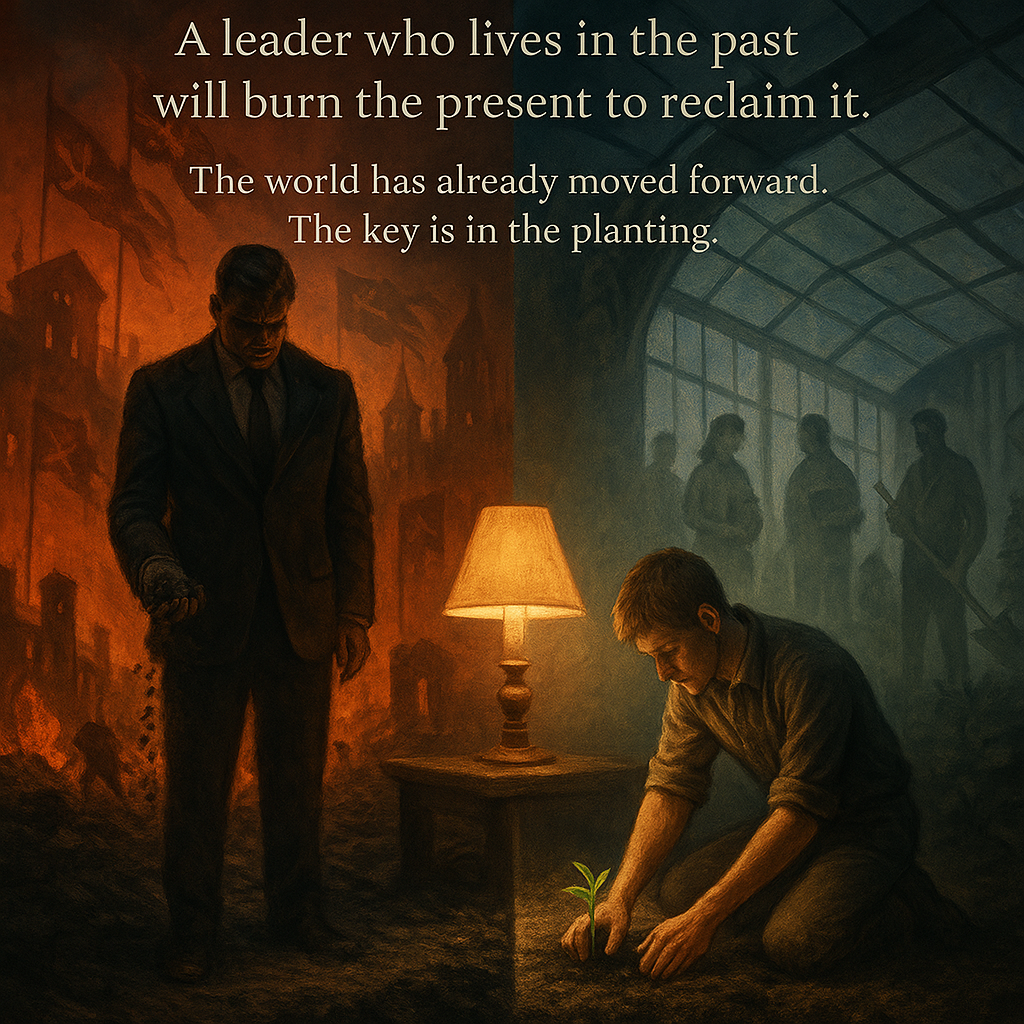
The rain had stopped, but the streets still smelled of damp stone and iron. Emil sat cross-legged on the rug, his schoolbooks untouched beside him, his mind circling the words from earlier that evening.
Grandfather had said: “When a leader ties himself to a wrongdoer, he sets the dignity of his nation on fire.”
The thought troubled Emil long after the dishes were cleared. At last he turned to his grandfather, who was oiling the worn hinges of his cane as though preparing it for another decade of service.
“But why?” Emil asked. His voice carried both curiosity and disbelief. “I understand the Four Absences—yes, it is blindness and fear. But how can leaders still think this way? They act as if time has not moved forward. They live in the past. Carpet bombings, occupations, genocides—things the whole world said never again. It’s the twenty-first century. The world is connected, global. Borders can be crossed with satellites, voices with a screen. There are courts, conventions, the UN. And yet they act as if none of it exists. As if conquest is still legal, as if no one will remember. How can they not see the change?”
Grandfather set the cane aside and folded his hands. His eyes, steady pools of patience, rested on Emil.
“They do not see it,” he said quietly, “because they do not live in it. A man can wear a suit sewn yesterday and still carry a mind stitched centuries ago. Some leaders are prisoners of history, but not in the way you think. They are not burdened by its lessons—they are enthralled by its shadows. They look back to an age when conquest was lawful, when occupation was victory, when the strong devoured the weak and called it destiny.”
He leaned closer, his voice heavy.
“Before the World Wars, conquest was not shame—it was a badge. Occupation was not crime—it was empire. Genocide was not a forbidden word—it was the ‘price of civilization.’ But after the wars, humanity drew a line. The UN, the Geneva Conventions—imperfect though they are—made what was once legal into the highest crime. They were humanity’s attempt to step forward together, to outlaw the fire itself.”
Emil frowned. “Then these leaders—when they bomb cities, starve children, murder civilians—they are living in a time that has already passed?”
“Yes,” Grandfather said. “They are men out of time. Anachronisms in suits. They wield old weapons in a new world, believing history will still reward them. But they do not see that history has changed its grammar. They act with the arrogance of the conqueror, but the world now names them criminal. They believe the past will protect them, but the very structures they scorn—the courts, the treaties, the archives of digital memory—will outlive them and testify against them.”
He paused, letting the words hang in the room like smoke.
“This is Absence One and Absence Four together—the absence of wisdom and the absence of awareness. No wisdom to see that the age of empires is gone. No awareness to grasp that we live in a webbed world, where every act is witnessed, recorded, judged. They believe themselves strong, but in truth they are brittle relics of another age.”
Emil sat very still, tracing patterns in the rug with his fingertips. “Then why do people follow them? Why do nations still obey such men?”
Grandfather’s gaze softened. “Because the past has its seductions. It promises simplicity—victory or defeat, us or them. It whispers that brutality is strength, that fear is safety. To the frightened, these lies feel familiar. To the ambitious, they feel useful. But both are deceptions. Both are chains.”
The old man reached for the lamp wick and lowered the flame, casting long shadows across the room.
“Remember this, Emil. A leader who lives in the past will burn the present to reclaim it. But no fire can bring back what history has buried. The world has already moved forward. The only question is whether we move with it—or are dragged behind, ash in hand.”
Emil closed his eyes, and in his imagination he saw it clearly:
One path showed a warlord clutching fistfuls of ash, his crown tarnished, his banners torn—trying to resurrect a world that no longer existed. The other path showed a boy in a greenhouse, his hands dirty but alive, pressing a seed into dark soil that still held promise.
The most dangerous prison was not made of stone or iron, but of time.
And the key, Emil now realized, was in the planting.

